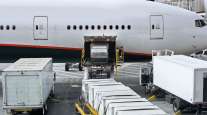U.S. Xpress, CRST Outline Expanded Services
This story appears in the Nov. 21 print edition of Transport Topics.
ATLANTA — Large truckload carriers U.S. Xpress Enterprises and CRST International last week said they are expanding their team-driver service offerings to tap the refrigerated truckload market for produce shipments.
U.S. Xpress has begun running year-round refrigerated teams between West Coast and East Coast points. CRST plans to start its service on Dec. 1 between California and the Northeast, using team drivers to haul produce part of the year and dry freight for the majority of the time.
“We were encouraged to get into the refrigerated business by one of our largest customers, Wal-Mart,” Bob Poulos, U.S. Xpress vice president of sales and marketing, told Transport Topics. He said the carrier is operating refrigerated teams between West Coast points and locations in the East from Lewiston, Maine, to South Florida.
In addition to the expansion into refrigerated carriage, U.S. Xpress has initiated expedited service, first targeted at the auto market.
Both companies officially introduced the service expansions at a meeting here last week that included the Intermodal Association of North America, the Transportation Intermediaries Association and the National Industrial Transportation League.
U.S. Xpress, ranked No. 15 on the Transport Topics Top 100 For-Hire Carriers in the United States and Canada, is primarily a dry van carrier. CRST, which ranks No. 26 on the TT 100, is primarily a dry van and flatbed carrier.
“Our long-term strategy is that when we get more lane density we will enter the regional markets,” with an added focus on chemical and pharmaceuticals that require temperature control, U.S. Xpress’ Poulos said. The company is targeting 250 teams for refrigerated service by the middle of next year, he said.
“We will be providing transcontinental transportation of perishable products in less than 60 hours at a price that is competitive with single drivers,” said Dave Rusch, president of CRST International, declaring that the transit time typically is at least two days faster than single-driver service.
Based on data from information services provider TransCore, a transcontinental refrigerated load can generate more than $5,000 in revenue for a 2,800-mile trip. Refrigerated rates can be as much as 30% higher than dry freight at peak times such as summer, according to data from TransCore.
“The perishables model is changing — in the past, the supermarkets have been regional in nature,” said Thomas Finkbiner, of Surface Intermodal Solutions LLC, which is working with CRST to roll out the team-driver service known as “Temperature-Controlled Team Service.”
Finkbiner said, “Now, Wal-Mart is the biggest purchaser of perishables. They want to work directly with farmers and route the traffic.”
Traditionally, he said, owner-operators working with brokers have dominated the perishables market. CRST, which is targeting 6,000 miles of weekly driving for the teams, currently has a limited presence in the refrigerated market, operating a specialized fleet targeted at individual customers, according to Finkbiner.
Unlike CRST, U.S. Xpress is focused on year-round produce moves.
“When we are not in the traditional produce season, they [Wal-Mart] will bring in produce from places such as Chile,” Poulos said. “We will pick it up at refrigerated [distribution centers] and deliver it.”
Ted Prince, also at Surface Intermodal Solutions, said CRST’s service will be differentiated in another way from traditional refrigerated fleets that operate in regional markets with average lengths of haul between 500 and 600 miles.
Those fleets, he said, may focus on longhaul moves for one or two weeks, while CRST’s service will be available during the full 20 weeks annually when perishables shipments are strongest.
Prince also said there won’t be a premium above single driver rates for a pre-arranged number of refrigerated loads.
“The value proposition for the shipper is that they will have assured capacity with company trucks and company drivers,” Prince said.
On the expedited side, Poulos said U.S. Xpress also was encouraged by one particular customer — Volkswagen USA, which is now manufacturing its Passat sedan at a plant in Chattanooga, Tenn., where U.S. Xpress is headquartered.
“We are building a fleet of owner-operators around that expedited business,” Poulos said, using a combination of 24-foot trucks and package vans. “We are the freight manager for them.”
“Our go-to-market [expedited] strategy is unique,” Poulos said. “This is a market that is really untapped by other truckload carriers, and it’s a great complement to our premium business.
“Our current premium business is supply and demand driven,” he said. “We go into over- and underbooked markets and play the spot market.”
“We are going after the true just-in-time shipper,” Poulos said, defining the delivery window as to-the-minute. He said the company was planning to have at least 250 vehicles providing this service by the middle of 2012.
In addition to the refrigerated and expedited services, U.S. Xpress also recently launched regional service in the Northeast, using a fleet of 200 drivers. The service is all one-way business and is not dedicated freight, Poulos added.




